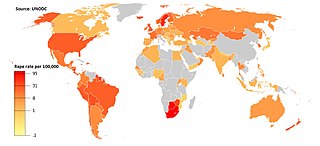Related Research Articles

Sexual objectification is the act of treating a person solely as an object of sexual desire. Objectification more broadly means treating a person as a commodity or an object without regard to their personality or dignity. Objectification is most commonly examined at the level of a society, but can also refer to the behavior of individuals and is a type of dehumanization.

Robert William Jensen is a former professor of journalism from the University of Texas at Austin. From 1992 to 2018 he taught graduate and undergraduate courses in media law, ethics, and politics.

Rape culture is a setting, studied by several sociological theories, in which rape is pervasive and normalized due to societal attitudes about gender and sexuality. Behaviors commonly associated with rape culture include victim blaming, slut-shaming, sexual objectification, trivializing rape, denial of widespread rape, refusing to acknowledge the harm caused by sexual violence, or some combination of these. It has been used to describe and explain behavior within social groups, including prison rape and in conflict areas where war rape is used as psychological warfare. Entire societies have been alleged to be rape cultures. It is associated with rape fantasy and rape pornography.
Michael G. Flood is an Australian sociologist and an associate professor at the Queensland University of Technology School of Justice. Flood gained his doctorate in gender and sexuality studies from the Australian National University. His areas of research are on violence against women, fathering, pro-feminism, domestic violence, the effects of pornography on young people, safe sex among heterosexual men, men's movements as a backlash to the feminist movement, men's relationships with each other and with women, homophobia, men's health, and gender justice. He is a regular contributor to and is regularly quoted in the media on these and other issues.
Michael Alan Messner is an American sociologist. His main areas of research are gender and the sociology of sports. He is the author of several books, he gives public speeches and teaches on issues of gender-based violence, the lives of men and boys, and gender and sports.
The effects of pornography on individuals or their intimate relationships depend on the type of pornography used and differ from person to person. Consumption of pornographic material is associated with negative and positive impacts. It has been studied particularly for associations with addiction as well as effects on the brain over time. Some literature reviews suggest that pornographic images and films can be addictive, particularly when combined with masturbation, while others maintain that data remains inconclusive. Other research has looked at pornographic material's relation to acts of sexual violence, with varying results.

Gail Dines is professor emerita of sociology and women's studies at Wheelock College in Boston, Massachusetts.
Examples of misogyny exist in many published forms, within multiple cultures and well-observed works. Technological advances in the modern era have contributed proficient means to media and marketing to the resultant mass media in the 21st century. The merging of misogyny and mass media has made numerous examples where studies have concluded correlations between misogynous messages, both obvious and subliminal. Corresponding physical appearance of violence and hateful conduct may be seen relative to exposure.
Queer pornography depicts performers with various gender identities and sexual orientations interacting and exploring genres of desire and pleasure in unique ways. These conveyed interactions distinctively seek to challenge the conventional modes of portraying and experiencing sexually explicit content. Scholar Ingrid Ryberg additionally includes two main objectives of queer pornography in her definition as "interrogating and troubling gender and sexual categories and aiming at sexual arousal."
The exploitation of women in mass media is the use or portrayal of women in mass media as objects to increase the appeal of media or a product to the detriment of, or without regard to, the interests of the women portrayed, or women in general. This process includes the presentation of women as sexual objects and the setting of feminine beauty ideals that women are expected to reflect. Sexual exploitation of women in the media dates back to 19th century Paris, in which ballerinas were exposed to harassment and objectification. The ballerinas in the Paris Opera Ballet were ogled by their male audience members and often even expected to perform sexual favors for the male subscribers behind the scenes. Feminists and other advocates of women's rights have criticized such exploitation. The most often criticized aspect of the use of women in mass media is sexual objectification, but dismemberment can be a part of the objectification as well.

Rosalind Clair Gill is a British sociologist and feminist cultural theorist. She is currently Professor of Social and Cultural Analysis at City, University of London. Gill is author or editor of ten books, and numerous articles and chapters, and her work has been translated into Chinese, German, Portuguese, Spanish and Turkish.

Chauntelle Tibbals is a sociologist from the United States. Her scholarly focus includes studies in gender, sexualities, work and organizations, media and new media, popular culture, and qualitative research methods.
Pornification is the absorption by mainstream culture of styles or content of the sex industry and the sexualisation of Western culture, sometimes referred to as raunch culture. Pornification, particularly the use of sexualised images of women, is said to demonstrate "how patriarchal power operates in the field of gender representation". In Women in Popular Culture, Marion Meyers argues that the portrayal of women in modern society is primarily influenced by "the mainstreaming of pornography and its resultant hypersexualization of women and girls, and the commodification of those images for a global market". Pornification also features in discussions of post-feminism by Ariel Levy, Natasha Walter, Feona Attwood, and Brian McNair. Pornography began to move into mainstream culture in the second half of the 20th century, now known as the Golden Age of Porn. Pornification is a product of the widespread availability of porn on the internet.
Karen Elizabeth Boyle, is Professor of Feminist Media Studies at the University of Strathclyde, previously she was professor of Feminist Studies at the University of Stirling, and before that was a lecturer in film and television studies at the University of Glasgow. She has published a number of articles on feminism, violence and pornography.
Rebecca Suzanne Whisnant is professor and chair of the philosophy department at the University of Dayton.
Ana Julia Bridges is an assistant professor at the department of psychological science, University of Arkansas, and one of the chief editors of the journal Sexualization, Media, and Society.
Sexualization, Media, and Society (SMS) is a peer-reviewed, interdisciplinary open-access academic journal, published by SAGE, to provide a resource for diverse scholars and activists interested in critically examining the phenomenon of sexualized media as it affects individuals, relationships, communities, and societies.

Michael Paul Johnson is emeritus professor of sociology, women's studies, and African and African American studies at Pennsylvania State University, having taught there for over thirty years. It is where he developed his typology for describing intimate partner violence.
The feminist pathways perspective is a feminist perspective of criminology which suggests victimization throughout the life course is a key risk factor for women's entry into offending.
Porn studies is the critical academic study of pornography and its associated industry, typically in the broader rubric of the field of sexuality studies. Porn studies takes as its object of research pornography itself — its visual artefacts, cultural role, controversies, and influence on the public — as well as the manner in which pornography is researched. The development of porn studies as a field of academia has been driven by the publication of the same name.
References
- 1 2 3 One Hundred and Seventy-Fifth Final Exercises (PDF). University of Virginia. May 16, 2004. p. 27. Retrieved February 11, 2021.
- ↑ Boyle, Karen (2010), "Notes on the contributors", in Boyle, Karen (ed.), Everyday pornography, London New York: Routledge, pp. viii–ix, ISBN 9780415543781.
- ↑ "People: Jennifer A. Johnson". vcu.edu. Virginia Commonwealth University . Retrieved December 28, 2015.
- ↑ "Editorial board: Sexualization, Media, and Society". SAGE. 27 October 2015. Retrieved December 28, 2015.
- ↑ "Jennifer A. Johnson, Ph.D." Virginia Commonwealth University. Retrieved February 11, 2021.
- ↑ Johnson, Jennifer A. (1993). Women at the center: a review of theories using the female offender as the target population (MS thesis). Virginia Commonwealth University. OCLC 30497137.
- ↑ "Graduate program alumni". sociology.virginia.edu. Department of Sociology, University of Virginia. 2004. Retrieved December 28, 2015.